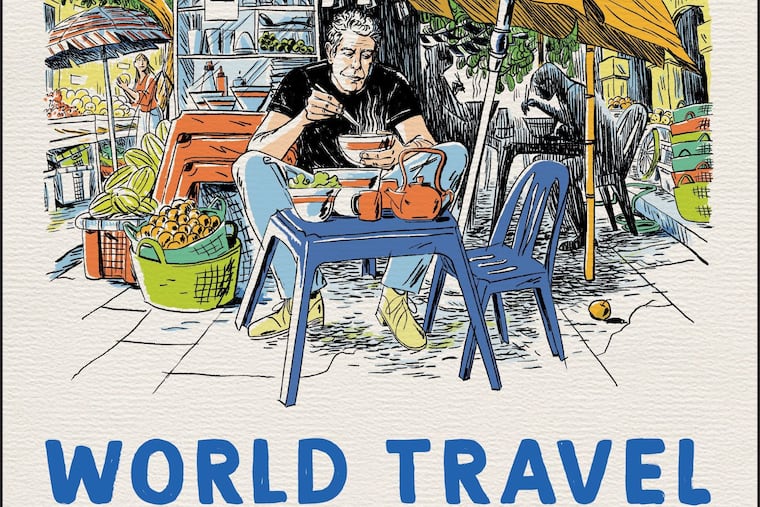Anthony Bourdain’s posthumous ‘World Travel’ should inspire some post-pandemic trips | Book review
Nearly 22 years after Bourdain’s best-selling memoir “Kitchen Confidential” was published, fans are getting another book from the late travel author, completed by his longtime assistant.

World Travel
By Anthony Bourdain
Ecco. 480 pp. $35
Reviewed by Natalie B. Compton
Nearly 22 years after Anthony Bourdain’s best-selling memoir Kitchen Confidential was published, fans have another book from the late travel author and television star. A concept Bourdain began working on in 2018, World Travel: An Irreverent Guide, was completed by his coauthor and longtime assistant, Laurie Woolever.
Filled with travel logistics, restaurant recommendations, Bourdain observations, personal essays from loved ones and colleagues, and illustrations throughout from artist Wesley Allsbrook, the book is both a literal guide for seeing the world as well as a source of inspiration as we plan post-pandemic travel.
The book is swimming in highly quotable mantras to live by. We gathered our favorites to channel when you hit the road again.
In the France chapter of World Travel, Bourdain instructs those lucky enough to visit Paris to do as little as possible. Running through back-to-back activities like hitting the Louvre, the Eiffel Tower, and the Notre Dame in one day is going to leave you exhausted and overwhelmed.
“The most important thing to do the instant you arrive in Paris is stop,” Bourdain said.
Don’t pack your itinerary with a destination’s highlights unless you want to miss out on its magic. Instead, slow down and savor a new place. Grab a seat at a sidewalk cafe, at the end of a dive bar, on a city park bench, and take it all in.
While Bourdain reveled in off-the-beaten-path exploration, he could also appreciate more classic tourist experiences, as seen with this quote recalling his time at the Jaisalmer Desert Festival in the Indian state of Rajasthan.
He celebrated places where tourists flock but that still hold up, from Katz’s Delicatessen in New York to Angkor Wat in Cambodia. Throughout the book, he also championed visiting places travel TV hosts and regular people alike would appreciate, such as museums, book stores, UNESCO World Heritage Sites, and wildlife conservancies.
In the quote above, Bourdain was talking about Cuba. However, it’s a sentiment that can be applied anywhere you go. He advises people visiting Havana that “if you can, you should come here with your eyes open and see.” Get to know a place for where it’s going and where it came from.
Yes, Bourdain would wax poetic on a destination’s cuisine and bar culture and unconventional points of interest, but Woolever explained that he also read about a place’s history and literature before a visit so he could put things into context.
Also from the Paris section of the book, this piece of Bourdain wisdom captures the idea of enjoying a new place without assumptions, even if you’ve familiarized yourself with its history and culture. As you travel again, go in with an open mind and see where a place can take you.
And if you’re going in with preconceived notions, don’t be afraid of having your opinions challenged. In World Travel, Bourdain confesses to changing his mind and benefiting as a result, such as when he went to Los Angeles with a New Yorker’s attitude — and ultimately admitted he loved the place.
The book’s South Korea chapter kicks off with this message of gratitude for Nari Kye, a woman who worked with Bourdain and his team when they worked on No Reservations and Parts Unknown in her home country. It’s a testament to how important people can be as a part of your travel experience.
In a time of mask-wearing and social distancing, it may feel inconceivable to talk to strangers, but getting to know locals — once coronavirus is no longer a threat to you or them — is an essential part of traveling like Bourdain.